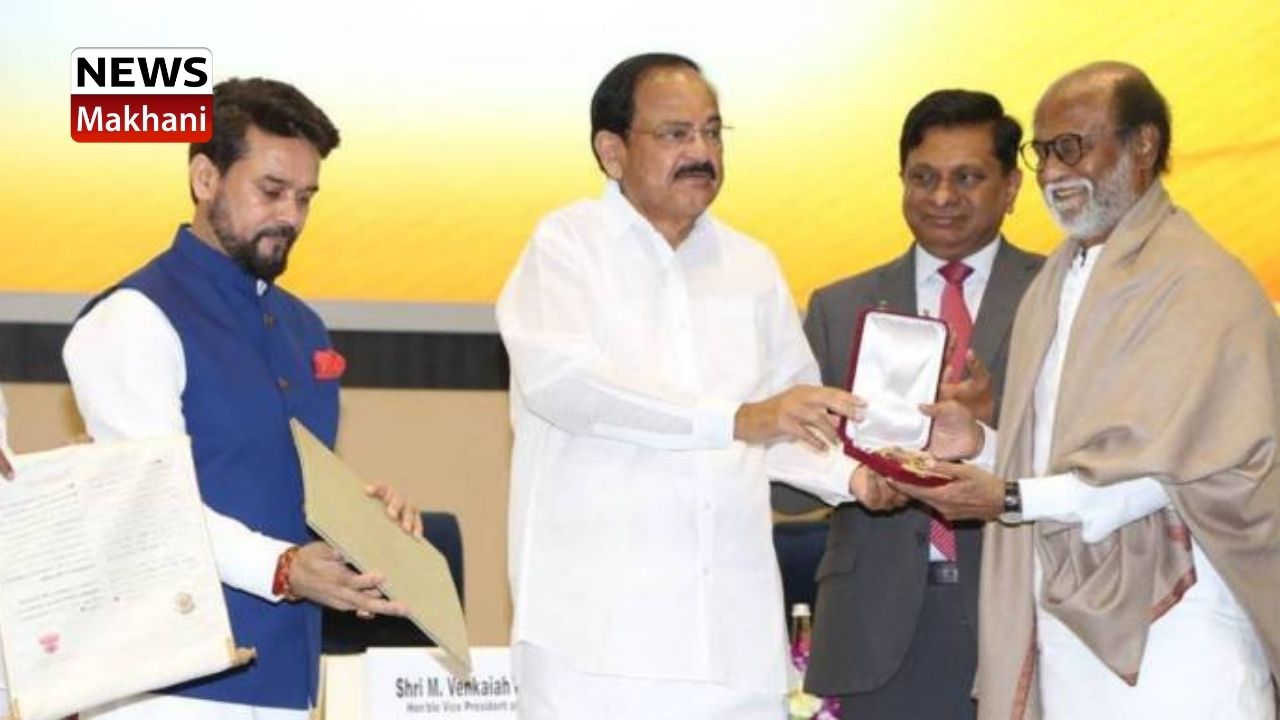Film should be a carrier of social, moral and ethical messages: Vice President
VP advises the cinema industry not to do anything that weakens our culture & traditions.
Films are among our foremost cultural exports: Vice President
VP congratulates Dadasaheb Phalke Award winner, Shri Rajnikanth & other recipients of National Awards
The Vice President, Shri M. Venkaiah Naidu today called upon film makers to desist from depicting violence, gross vulgarity and obscenity in films.
Speaking after presenting the prestigious DadasahebPhalke award to popular actor Shri Rajnikanth and national awards to actors of cinemas of various languages, the Vice President said a film should be a vehicle with a higher purpose—a carrier of social, moral and ethical message. “Moreover, films should refrain from highlighting violence and should voice society’s disapproval of social evils,’ he added.
READ MORE :-Dr. Mansukh Mandaviya to address the Investor Summit – “Opportunities and Partnerships in Pharmaceuticals & Medical Devices” on 27th October, 2021
Observing that a good film has the power to touch hearts and minds, Shri Naidu said cinema is the cheapest entertainment in the world and urged filmmakers and artists to use it for the betterment of the people, society and nation.
Stressing the need for cinema to usher in positivity and happiness, he said “Experience tells us that a film with a message has lasting appeal”. Apart from entertainment, cinema also has the power to provide enlightenment.
The Vice President advised the cinema industry not to do anything that weakens the great culture, traditions, values and ethos of our grand civilization. Indian films carry an important message to audiences across the world. They should portray a snapshot of ‘Indianness’ or ‘Bharatheeyatha’ to the outside world and need to be effective ambassadors in the world of cultural diplomacy, he stressed.
Referring to India’s soft power as the largest producer of films in the world, he said that our films are watched and appreciated across the world—in Japan and Egypt, China, the United States, Russia, the Middle East and Australia, and a host of other countries. “Films are among our foremost cultural exports and serve as a key link in connecting the global Indian community to the rhythms of life back home’, he added.
Observing that Cinema has no geographical or religious boundaries and speaks a universal language, he said the National Awards not only highlight the talent pool in the Indian film industry but also reflect its richness and diversity.
Pointing to the reality of climate change, the Vice President stressed the need for the film fraternity to highlight the importance of protecting nature. The COVID-19 pandemic too taught us the importance of respecting nature, he added.
Congratulating Shri Rajnikanth for winning this year’s DadasahebPhalke Award, he said that the iconic thespian’s unmatchable style and acting skills have indeed given a new dimension to the Indian film industry. Mentioning his memorable performances in MoondruMudichu, Sivaji: The Boss, Vayathinile, Bairavi, he said the Thalaivar epitomizes the perfect balance between artistic expression and mass appeal, something all young film-makers could do well to attempt.
The State of Sikkim received the most film-friendly state award.
Information and Broadcasting Minister, Shri Anurag Thakur, Union Minister of State for Information and Broadcasting, Shri S Murugan, Secretary of the Ministry of Information and Broadcasting, Shri Apurva Chandra, Features Films Jury President, Shri N. Chandra, Non-Feature Films Jury President, Shri Arun Chadha and others were present.
Following is the full text of speech –
“I am delighted to be here for the 67th National Film Awards ceremony. I would like to begin by congratulating all the award winners, as also countless others who have worked on the films that are recipients of awards today. This is a special moment for all of you—this ceremony underscores the recognition of your talent and hard work.
The Indian film industry has made its mark in a variety of languages, ranging from Bhojpuri to Tamil, Odia to Assamese, to several others. And yet, as all of us know, Cinema is a language in itself and has no geographical or religious boundaries. It speaks a universal language and touches raw human emotions.
The Indian Film industry has performed well over the years with a rise in international releases and increased reach of Indian movies abroad.
The prestigious National Film Awards organized by the Ministry of Information and Broadcasting is a great initiative which serves to motivate our filmmakers. It not only highlights the talent pool in the Indian film industry but also reflects its richness and diversity.
Let me congratulate this year’s DadasahebPhalke Award winner, Shri Rajinikath ji! One of the most celebrated actors of South Indian Cinema, ‘Thalaivar’ rules over millions of hearts and needs no introduction. The iconic thespian’s unmatchable style and acting skills have indeed given a new dimension to the Indian film industry.
His memorable performances in MoondruMudichu, Sivaji: The Boss, Vayathinile, Bairavi, stand apart and are a part of popular lore. Thalaivar epitomizes the perfect balance between artistic expression and mass appeal, something all young film-makers here could do well to attempt.
Friends,
The National Films Awards mirror the diversity of our Indian film industry, an industry that is a confluence of many Indian language markets. Needless to add, each of these languages is unique in behavioural and audience preference. Therefore, the National Film Awards is in a sense, a tribute to India’s diversity—it fosters and recognizes the talent of India’s dynamic sub-cultures.
I convey my compliments to all Members of the Jury and the Directorate of Film Festivals, as also the Ministry of Information and Broadcasting, for the commendable job they did at every stage of this selection process.
The fact that India is the largest producer of films in the world, is an expression of its soft power with a transcontinental footprint. Our films are watched and appreciated across the world—in Japan and Egypt, China and the United States, Russia and Australia, and a host of other countries. Films are among our foremost cultural exports and serve as a key link in connecting the global Indian community to the rhythms of life back home.
The Best Feature Film this year, Marakkar, portrays the courageous life-events of a rebellious naval chief, Mohammad Ali Marakkar, also known as KunjaliMarakkar IV. The historical action-packed film revolves around this heroic figure who is believed to be the first Indian Naval Commander and was also a freedom fighter in the war against the Portuguese.
I am happy to see regional films with meaningful thematic content, getting due recognition. The Haryanvi film ChhoriyanChhoron Se Kam NahiHotin deals with the issue of curtailing freedom in the lives of women and is centred around a girl’s struggle to study and become an IPS Officer. In Anandi Gopal we celebrate one of the first Indian female doctors of Western medicine. Nila Madhab Panda’s Odia film KaliraAtita deals with the issue of the rising sea levels due to global warming, a subject of burning importance with universal relevance.
Telugu cinema has been a major contributor to the development of Indian Cinema. Over a period of more than a hundred years, the Telugu film industry has given us many hits from Peddamanushulu, the first Telugu movie to win National Film Award under Best Telugu Film Category to the 2017 Indian war film Ghazi. The recent Best Telugu Film, Jersey, deals with late bloomers who seek to shine in sports, but face several hurdles. Cinema serves as a powerful medium for the promotion of sports and the film, I am sure, will serve as a source of inspiration to a whole generation of aspiring young sportsmen.
Sisters and brothers,
A good film, as you are aware, has the power to touch hearts and minds. And this power which you as filmmakers and artistes possess, should be used for the betterment of the people, society and nation. Cinema should usher in positivity and happiness and not be restricted to plain entertainment. A film should be a vehicle with a higher purpose—a carrier of a social, moral and ethical message. Moreover, films should refrain from highlighting violence and should voice society’s disapproval of social evils. They should totally avoid the use of gross vulgarity and obscenity. Experience tells us that a film with a message has lasting appeal.
Our film industry has come a long way from the pioneering days of DadasahebPhalke. Technical excellence, sound effects, cinematography, experiments with forms, out-of-the-box scripts, and excellence both behind and in front of the camera have revolutionized our Cinema in the past few decades. It has been a long and enriching journey from the early days of DadasahebPhalke to films made in over 40+ Indian languages and dialects today.
Documentaries constitute a key arm of the industry since they deal with critical subjects of relevance. I am pleased to note that the government has played an important role in strengthening the documentary movement in the country.
We are living in exciting and transformational times for Cinema and for the wider entertainment economy. Technology has changed the way films are made as well as the way they are consumed. With the advent of low-cost data and smart phones, tablets and addition of OTT platforms, there is a clear shift in viewership patterns. The Indian film industry is adapting to these changes and I am sure it will continue to devise strategies to convert challenges into opportunities.
Over the years, Cinema has become an integral part of our cultural consciousness. I am positive that the focus of the Indian film industry would shift gradually towards emphasis on content-driven films where the story is the hero. The staggering number of films made in different languages in our country every year, is a testimony not only to the popularity of films, but also to the fact that the film industry provides livelihood to thousands of families across the country.
Friends,
The cinema industry should not do anything that weakens our great culture, traditions, values and ethos of our grand civilization. Indian films carry an important message to audiences across the world. They should portray a snapshot of ‘Indianness’ or ‘Bharatheeyatha’ to the outside world and need to be effective ambassadors in the world of cultural diplomacy.
Once again, I would like to congratulate all the Award winners on their outstanding achievements. I have no doubt that each one of you will excel in your future roles and contribute to the well-being of society, our nation and the world at large.
Jai Hind!”

 हिंदी
हिंदी






